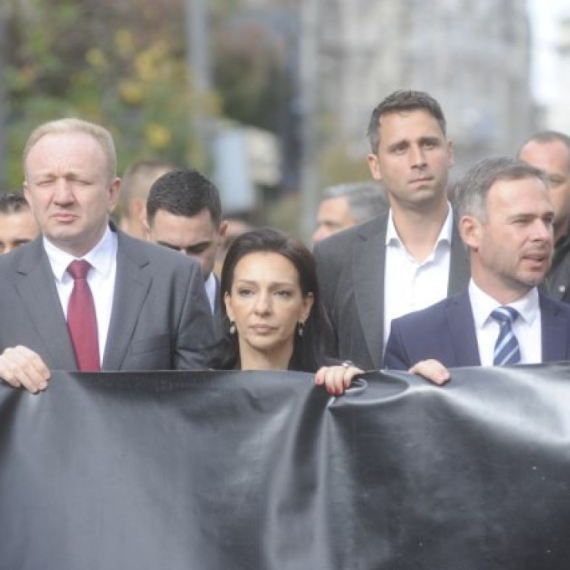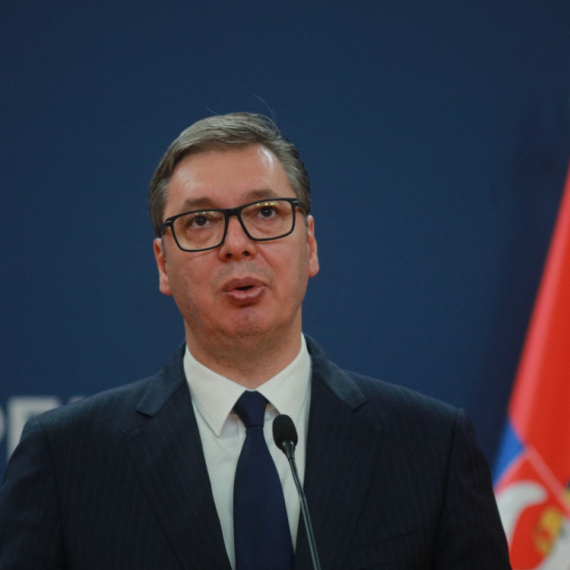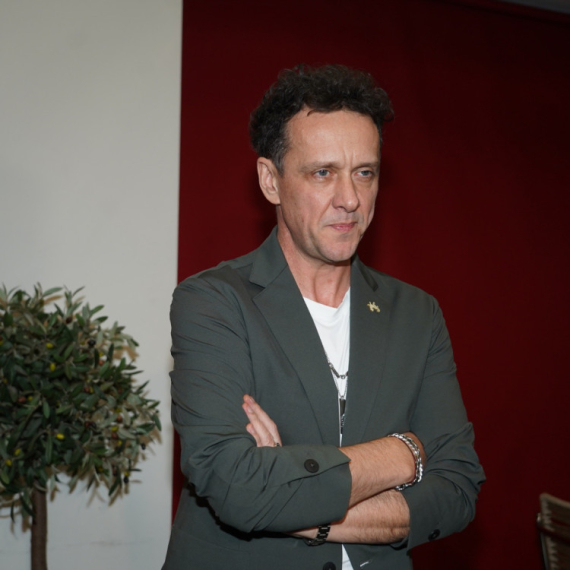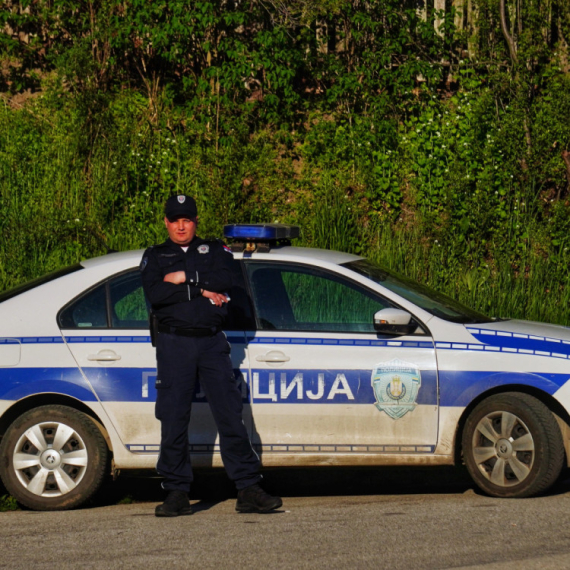Emissaries of Militant Islam Make Headway in Bosnia
Thursday, 22.03.2007.
10:55

Emissaries of Militant Islam Make Headway in Bosnia
Only until six months ago, Nermina from Sarajevo was one of those women dressed in hijab. For five years she was a follower of the Wahhabi movement and wore a long black dress concealing her entire body and a veil covering her hair, neck and face. She also had to wear gloves.Nermina (not her real name) left the movement and abandoned the hijab after feeling stung by the pleas of her eight-year-old daughter to take her to the swimming pool. “I did this for them,” she says of her children. “I think they feel lost after everything they’ve been through.”
Though she has changed her mind about Wahhabism, Nermina easily recalls why she once found it attractive. “The Wahhabi were the only ones who didn’t bring up nationality as an issue after the war,” she said. “They offered me an escape into what I saw then as the spiritual world.”
From 1992 to 1995, Bosnia-Herzegovina was torn apart in a war that set its three main ethnic communities against one another. Distinguished as much by religion as ethnicity, its Orthodox Serbs, Catholic Croats and Muslim Bosniaks remain largely divided, co-existing under international administration in two entities, one Republika Srpska, Serb-dominated, and the other the Federation of BiH.
Warnings of a potential terrorism risk within the Federation`s Islamic community regularly emanate from Republika Srpska.
But voices of concern over the Wahhabi movement are also being raised within the Federation.
Nermina is one of several former members of the movement we spoke to who feels it has a dangerous aspect.
Many of our other interviewees, including academics, former Wahhabists, community activists and some theologians, complained of the movements’s overly aggressive attitude to people who do not share its beliefs. Many also added that these go against the grain of Bosnia’s own, centuries-old heritage of Sunni Islam.
There is no reliable information about the precise number of Wahhabis in Bosnia and Herzegovina, but the Muslim movement first appeared there in the early 1990s, as war was breaking out in the former Yugoslav republic. Now, many say Wahhabism continues to grow ever more present.
And recent polls reflect the controversy that is also building over the movement’s values, tactics and goals, as well as its size. Almost 70 per cent of Bosnian Muslims say they oppose the movement, while around 12 per cent support it.
The Islamic Community, the official institution for Bosnia’s Muslims, denies the Wahhabi pose a threat, although it set up a commission last year to analyse “the spiritual situation” within the Muslim community.
Its reluctance to openly confront and condemn the movement has perturbed many, coming in the wake of several violent conflicts that erupted after Wahhabists stormed local mosques.
In the last six months, several public debates, one book and a series of newspaper articles have alleged that the Islamic Community’s silence on Wahhabism may be explained by its dependence on the same Saudi Arabian sources as the controversial movement for financial support.
Balkan Insight sought documentation of such a link, but was unable to trace any official proof of its existence.
Others suspect that the Islamic Community`s ambiguous stance towards the Wahhabis comes down to internal strife between its members, some of whom oppose and some of whom support it.
Human rights experts insist on the controversial movement’s religious freedom, provided that it doesn’t inhibit the freedoms of others.
But many people want Bosnia’s Islamic Community, as well as the secular authorities, to take a tougher line on the problems that frequently arise from Wahhabi activities. They are unhappy with what has been done so far, or rather not been done.
Some Islamic theologians are particularly forthright on this, calling the Wahhabi movement a threat. Resid Hafizovic, professor of Islamic dogma at the Sarajevo faculty of Islamic Sciences, even says the Wahhabis in Bosnia are “a potentially fatal virus.”
Balkan Insight requested an interview with Reis-ul-Ulema Mustafa Ceric, the head of Bosnia’s Muslim community, to clarify these issues but was referred to the Islamic Community’s website and public statements already issued by its representatives.
Of the Wahhabi followers that we approached when they gathered at one of Sarajevo mosques, all except one refused to be interviewed.
Mujahideens introduce Wahhabism to Bosnia
Balkan Insight spoke to four former followers of Wahhabism in Bosnia-Herzegovina. One said the arrival during the recent war of so-called mujahideen, foreigners who fought in units of the Bosnian army alongside local Muslims, was a key factor in luring people to join the movement.We also spoke to a current Wahhabi follower, a 22-year-old man who declined to give his name. Standing with a large group of his brethren in front of Emperor`s Sarajevo mosque, he said he initially admired the movement for its role in the 1992-1995 war. “They told me we would all have been killed if the mujahideen had not come to our aid,” he said.
A United Nations 1993 report on human rights in Bosnia-Herzegovina mentions the wartime activities of El Mujahid units in central Bosnia. Most mujahideen fighters were mercenaries who came to Bosnia-Herzegovina from Arab countries. Apart from their specific appearance, they preached a style of Islam previously unknown to local Muslims and demanded complete subordination to their rules. They regarded the Bosnian Islamic tradition a petty invention and detested it as a local rite forbidden by true Islam.
Believing it should be suppressed, they soon started harassing people in Zenica, central Bosnia, who refused to dress by their rules, according to media reports. This meant donning a veil if you were a woman and growing a beard if you were a man.
Clashes between Bosnian traditionalists and Wahhabis quickly flared up across central Bosnia, lasting throughout the war.
The judgement of Bosnia and Herzegovina’s war crimes court against Abduladhim Maktouf, a mujahideen who was granted Bosnian citizenship, provides damning evidence of what some of these foreign fighters got up to in that region.
Maktouf, born in 1959 in Iraq, was convicted in 2006 to five years in prison for being part of group that abducted and murdered several Croatian civilians in the Travnik area.
Another case recently tried concerned Sefik Alic, a former member of the Bosnian army’s Fifth Corps. He was charged with failure to prevent or investigate the murder of four Serb prisoners in Bosnian Krajina in 1995, of which Al Harbi Tewfik, a Saudi national, is suspected.
The authorities apprehended Alic and issued an arrest warrant for Tewfik in 2006. Tewfik, also granted Bosnian citizenship, is still at large.
Local religious experts say that Wahhabi followers have rejected Bosnia’s authentic and deeply rooted religious traditions, the Dervish and Sufi Islamic schools.
The Wahhabi movement came to Bosnia with strong support from Saudi Arabia, where Wahhabi Islam is official practice. All four of its former Bosnian followers who spoke to Balkan Insight – Nermina and Emir under pseudonym, and publicly, Adnan Hasanbegovic and Jasmin Merdan – learned the basic rules about the movement from a book containing the insignia of the High Saudi Committee, a humanitarian organisation from Saudi Arabia.
This Committee operated in Bosnia from the start of the war until a few years ago, under the auspices of a Saudi government ministry. Local media reports say its official business in Bosnia was to finance the reconstruction of mosques and housing, having also channelled humanitarian aid to the country during the war. Initially, its staff was exclusively Arab.
Husein Smajic, the Mufti of Sarajevo, recently said the rise of Wahhabism in Bosnia and Herzegovina had been closely tied to the activities of different humanitarian organisations originating from Islamic countries. He said its proponents arrived with groups operating under names with Islamic prefixes. Although they registered as local citizens’ associations, they also formed communities to spread their religious teaching. The heads of those communities were not appointed by the Islamic Community in Bosnia-Herzegovina, Smajic told Oslobodjenje on 24 February.
After the war, conflicts involving Wahhabis spread to Sarajevo. In the spring of 1999, this Balkan Insight journalist was present when a group of Wahhabi followers broke up a conference of supporters of women’s rights in Afghanistan, then still ruled by the Taleban. The group violently disrupted the meeting, triggering police intervention.
Then, in 2002, six Algerian-born men with Bosnian citizenship, publicly considered to be Wahhabis, were arrested and handed over to the United States authorities in connection with alleged terrorist activities. They were taken to Guantanamo Bay where they remain, although as yet no charges have been brought against them.
The High Saudi Committee, which registered as a local citizens’ association after the war, is no longer active in Bosnia-Herzegovina. After the September 11, 2001 terrorist attacks in New York, SFOR, the NATO-led peacekeeping force then present in the country, launched an investigation into the organisation.
During one raid on the Committee’s offices, SFOR seized documents allegedly containing maps of Washington, material for making false State Department identity cards and anti-American manuals designed for children, according to sources at that time within Bosnia’s intelligence services.
SFOR arrested four of the Saudi staff and shut down the organisation. The most visible physical legacy of Saudi Arabian influence is the King Fahd mosque in Sarajevo, built after the war. For years, it was not run by staff responsible to Bosnia’s Islamic Community. Although the latter has since posted its own man to head the mosque, it remains a popular gathering place for local Wahhabi faithful.
Emir said he stayed with the Wahhabi movement for three years, after inspirational stories of the foreigners who had come to fight alongside the Bosnian army drew him in.
“I was fascinated by their courage in coming to a foreign country to fight for someone else,” Emir recollected. “But as I was a soldier myself, I later realised most of the people preaching these ideas had never been to war and had no combat experience whatsoever.”
Targeting the mosques
The Wahhabi have continued to create controversy in Bosnia. On February 22, only an hour before believers were to attend afternoon prayers, we found the Imam of the Emperor’s Mosque in Sarajevo closing its doors for the first time ever. Sadrudin Iseric, visibly shaken, told Balkan Insight he would rather go down as the first man in history to close the 500-year old mosque during prayers than allow a fist fight to take place in it.He took this drastic action after learning that a group of Wahhabis, led by their self-declared teacher Jusuf Baricic, was preparing to raid the mosque and disrupt the prayers. After he locked the gates and went to pray in another mosque, police arrived at the scene, followed by Wahhabists and mainstream believers who had intended to pray there. The two distinct groups of Muslim believers stood on different sides.
Baricic has made a name for himself in Bosnia. He regularly comes to the city from his native village of Kalesija near Tuzla to preach his own interpretation of Islam and win over new followers.
In Kalesija, Baricic and his tiny group occupied the local masjid - a place to attend prayer when there is no mosque - and conducted daily prayers there. Their ritual is shorter and differs from the traditional service: among other things, they keep their legs further apart while standing to “prevent Satan from standing between them”.
Followers of Baricic’s teaching expelled the local Imam, appointed by the Islamic Community, and moved into the Kalesija masjid in 2006, leaving all other believers without a place of worship. The conflict peaked in February, when local people and Baricic`s followers physically clashed, leading to police intervention and the complete shutdown of the masjid.
Baricic is not the only aggressive missionary for a new brand of fundamentalist Islam in Bosnia. In 2006, another group, the Active Islamic Youth, issued a blacklist of 200 individuals whom they called “enemies of Islam.” Many were leading figures in Bosnia’s political and social life. The group urged all who shared their beliefs to help denounce the listed names. Bosnian institutions did not make any attempt to prosecute their activists.
Physical conflicts have also become more common. The media have reported fights in mosques across Bosnia, in Banovici, Cazin, Kladanj, Kalesija, Sarajevo and other towns and cities.
Last spring, there were even reports of Wahhabis assaulting young couples whose behaviour offended their morality. Police reports suggest such incidents are common in Sarajevo.
In December 2006, reports that Wahhabis had set up an illegal school in the village of Gornja Maoca near Tuzla triggered more outrage. The movement’s local leaders had organised classes in Arabic and separated the boys from the girls, after scrapping art and music as anti-Islamic subjects.
A Sharia state?
The increasing number of public incidents provoked by Wahhabists has drawn sharp criticism and questions about the movement’s goals. Fears exist that it seeks to abolish the secular state and introduce Islamic religious law – ‘sharia’ - in political and everyday life.Sevima Sali Terzic, a legal expert and human rights activist, believes that, at the end of the day, “the movement is not here only to promote its vision of Islam,” but has as its goal “to take over power… and realise political goals.”
She told Balkan Insight that protests against the Wahhabi’s strict practices alone are misplaced, and distract from the real threat posed by the movement.
“Now, unfortunately, the debate here is more about their appearance rather than their ideology and their attempt to impose their belief as the only true one”.
Professor Resid Hafizovic says their objectives in Bosnia are no different to those pursued by Wahhabis in Afghanistan or Chechnya, which are to annihilate traditional forms of Islam. In Bosnia, this means wiping out all traces of the old Ottoman culture, which is epitomised by monumental mosques and other symbols.
The professor of theology says Wahhabis want to destroy whatever doesn’t fit in with their “single-minded, fundamentalist tradition, or their monotonous Bedouin culture”.
Reis-ul-Ulema Ceric disagrees, though. He sees Hafizovic’s viewpoint as too radical and has rejected some of his assertions in public statements.
But Professor Esad Durakovic, an expert in oriental studies at Sarajevo university, backs up Hafizovic’s stance. He too believes Wahhabists are militants, determined to pursue their ideological and political objectives if given the slightest opportunity.
“Many Bosnians who have taken up the Wahhabi way are unaware of the movement’s objectives. It will be too late for many of them when they realise that they have reaped a whirlwind,” Durakovic said.
Sarajevo’s Mufti Smajic said he thought transformation of Bosnia into a state governed by sharia law was a Wahhabi goal.
This objective was not shared by the local Islamic Community, he maintained. “In a civic, multi-cultural society, we must act like others do rather than impose laws binding Muslim women to conceal every inch of their bodies,” the clergyman said.
“This is not an Islamic state. Islamic laws can’t be passed in countries where Muslims account for less than two-thirds of the population. We already have plenty of room here to practice our Islamic tradition in an acceptable manner.”
Emir, one of the movement’s former followers, told Balkan Insight “Wahhabi activities are based on complete hypocrisy and aimed at killing off all political beliefs”. “At the end of my road [with Wahhabism], I found the whole idea schizophrenic,” he said.
For years, Emir refused to have physical contact with women other than his immediate family or enter premises where alcohol was served, grew a beard and stopped seeing friends who held different beliefs. He tried to get his parents to join the Wahhabi and kept telling them their way of life was sinful.
“They [the Wahhabi] told us that shaking a woman’s hand was worse than piercing it with a prod. I always thought some Wahhabi ideas were a bit too radical but complied with them nonetheless,” Emir said.
“The Wahhabi were my first contact with this interpretation of Islam as my parents are atheists,” he added. “I was lost after the war and had a thousand questions. All I wanted was answers, at least to some of them. The Wahhabi were there to start answering them.”
Emir still admires some Wahhabi principles but now feels they are impractical in Bosnia. “Their rules of behaviour are based on a religious, sharia state rather than a secular state like Bosnia-Herzegovina,” he said.
Many Wahhabi followers who joined the movement like Emir and Nermina came from atheist families. Their parents had been educated in the communist era, when schools taught that religion was a delusional “opium for the masses”.
Although they found the initial answers to some of their questions within Wahhabism, some are still not sure what the movement really aims to achieve in Bosnia.
Too late to act?
Everyone we interviewed agreed that Wahhabism in Bosnia could have been effectively curbed if the Islamic Community had taken timely action. Now, all it can do is appeal to the authorities to prevent physical clashes between traditionalists and Wahhabi followers. Professor Hafizovic claims there are in fact many Wahhabi supporters within the Islamic Community itself.The Islamic Community says it has done what it can. Back in 1994, it issued an edict ordering all Muslim religious leaders in Bosnia to abide by the country’s existing Islamic traditions.
A committee, headed by the Sarajevo Mufti, was also set up last year to gather information on Wahhabi communities in Bosnia. So far, it has noted the existence of five such communities: one in the village of Maoce near Travnik, two in villages near Zenica, one in the vicinity of Kakanj and another in the village of Bocinja, known for a number of serious incidents provoked by the Wahhabi. The Wahhabi in Bocinja refuse to comply with Bosnian laws and have declared in the village their own sharia law.
The Islamic Community did react to Jusuf Baricic’s recent threats by condemning him in public and voicing support for the Emperor Mosque Imam’s decision on February 22 to close the house of worship during prayers.
Mufti Smajic said he personally had nothing against the Wahhabi practice of Islam but would not tolerate its followers’ aggressive behaviour.
“There are rules of conduct in every mosque but they keep coming to disrupt daily activities,” he said. “We told them they would not be allowed to keep doing that but they have shown us no respect. They tell us that mosques are the houses of Allah. That’s true, but order must be maintained even in Allah’s home,” the Mufti added.
He said the Islamic Community had no desire to deal with “problematic individuals” like Baricic.
Besides being sentenced by a Zenica court to five years in prison for domestic violence, Baricic has, according to police statements, a long record of other offences.
Most Bosnian Muslims, however, maintain the Islamic Community is not doing enough. “It is too distanced from young people,” said Adnan Hasanbegovic, a former Wahhabi follower who heads Sarajevo’s Centre for Non-Violent Action, a local citizens’ organisation.
Adnan says his organisation wants to open up a dialogue between Wahhabis and young people not attracted by the movement. He believes it’s the best way to keep a potential conflict at bay. He says the Islamic Community should have taken action a long time ago.
Jasmin Merdan is another former Wahhabi believer, now heading the ZAPRET organisation that opposes Wahhabi activities. He agrees that action should have been taken earlier: “The problem has been ignored for more than 10 years and we have come to an unenviable situation as a result. Bosnia-Herzegovina’s institutions and politicians have not acted timely and appropriately to deal with it.”
A public opinion poll conducted by Prism Research, a private agency, shows that 69 per cent of Bosnia’s Muslims oppose Wahhabists and their interpretation and practice of Islam in Bosnia-Herzegovina, while 12.9 per cent support them one way or another. The poll also shows the Wahhabi are predominantly supported by the poorly educated section of the population.
“Many of their supporters come from rural areas and the bottom of the social ladder. These people are desperate,” Emir said.
Nermina said the Wahhabi sect had infiltrated schools, universities and the media. They know most of the population dislikes them and have therefore adapted their outward appearance in order to enter public institutions, she claimed.
Nermina also told Balkan Insight she had been trapped in her house for almost three of the five years she wore a hijab. The men and women in the house were separated and all visitors had to comply with the rules.
“I believed that men were preordained to run public life while it was our duty to stay in the house,” she said. “Rare gatherings were our only contact with the outside world. Over the summer, we took trips to special camps near Lake Jablanica where women were also separated from men.
“We had a parallel world that others may not have noticed. We had our own public transport and grocery stores. We migrated inwards into our own closed sphere.”
Polygamy, which is illegal in Bosnia, was encouraged, she went on. “I know women whose husbands have several other wives,” she said. “They told us we would be rewarded in the next world if we put up with this hardship and refrained from being jealous. They keep talking about the next world to scare you, and promise you’ll go to heaven if you obey.”
At the same time, Nermina realised she increasingly disliked Wahhabism. She started getting out of the house and communicating with people. But when wearing the hijab, it was difficult to reach out. “People in Sarajevo are hostile towards Wahhabis and veiled women. It is impossible to get a job or even talk to anybody,” she said.
Eventually, her plight forced her to reconsider her beliefs and whole way of life. “I met a fellow Muslim woman who studied Islamic sciences,” she recalled.
“At first I treated her as an infidel, as she veiled only her hair while leaving her neck and ears exposed, which Wahhabism regards as a deadly sin,” she went on.
“But watching her and learning what a beautiful religion Islam is, I realised that everything I had learnt from the Wahhabi was wrong. My conversations with this woman brought up many crucial questions in my head. One of them was about polygamy, which I believed in wholeheartedly.
“She asked me why men shouldn’t put up with being cheated on to get their reward in the other world if women were being asked to do the same. It was a logical question but one I had never heard before.”
Professor Hafizovic believes the authorities ought to take immediate action. “I keep getting calls from parents whose children have been taken away by the Wahhabi; they are begging me to help them,” he said.
“The Wahhabi train these young people to break their own families into pieces and introduce their propaganda through literature and camps. There is nothing I can do to stop it but I hereby appeal to the authorities in this country to speak out,” Hafizovic told Balkan Insight.
Jasmin Merdan also said immediate steps were needed. “Decisive action needs to be taken, primarily by the Islamic Community and the authorities through cooperation with international institutions,” he said. “But it should rest on the Islamic Community first and foremost because destroying traditional Islam in Bosnia is the basic Wahhabi objective, just as it would be in any other country,” he added.
But there is not much sign of action yet. The Sarajevo Mufti says there is no real danger of the Wahhabi conquering Bosnia and denies their influence is spreading.
“We treat all our believers equally and do not discriminate against Wahhabis provided that they comply with the rules of conduct in mosques and those stipulated by Bosnia-Herzegovina’s Islamic Community,” he said. “If they break the rules, we will ask the authorities to intervene.”
Nidžara Ahmetašević is editor of BIRN BiH’s Justice Report.


























































Komentari 0